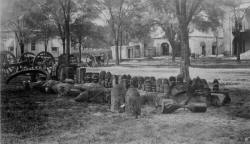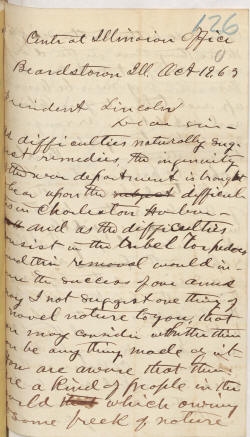|
ON LINCOLN'S MIND
 A bad idea for clearing Charleston Harbor A bad idea for clearing Charleston Harbor
 Send a link to a friend
Send a link to a friend
[November
02, 2013]
SPRINGFIELD -- With Nov. 19
marking the 150th anniversary of the Gettysburg Address, the Abraham
Lincoln Presidential Library and Museum is featuring letters to or
by Lincoln, written between the end of Battle of Gettysburg on July
3, 1863, and his famous speech at Gettysburg. Each letter represents
one of the many issues he had to face as chief executive of the
nation during its greatest crisis.
|
 With stalemate the order of the day, many citizens and friends
offered Lincoln unsolicited advice on solving some of the military's
most vexing problems. Case in point: Charleston Harbor. With stalemate the order of the day, many citizens and friends
offered Lincoln unsolicited advice on solving some of the military's
most vexing problems. Case in point: Charleston Harbor.
Charleston's political and economic importance to the war effort was
clear to both sides: It was the birthplace of secession and a hotbed
for blockade-running. However, the massive harbor was extremely
difficult to invade due to its formidable fortifications (the famous
charge of the 54th Massachusetts at Battery Wagner was also part of
the larger campaign to take Charleston) and the preponderance of
Confederate mines or "torpedoes."
Here is one potential solution:
___
Logan U. Reavis to Abraham Lincoln
Oct. 19, 1863
(Copy of letter transcript)
Central Illinoian Office
Beardstown Ill. Oct 19, 63
President Lincoln
Dear sir:
As difficulties
naturally suggest remedies, the ingenuity of the war department is
brought to bear upon the difficulties in Charleston Harbor, and as
the difficulties consist in the rebel Torpedoes and their removal
would insure the success of our arms, may I not suggest one thing of
a novel nature to you, that you may consider whether their can be
any thing made of it. You are aware that there are a kind of people
in the world which owing to some freek of nature can see better in
the night than they can in the daytime now might not some of those
kind of men be hunted up and taken to gen. Gilmore and let him
arrange some small boats say not much larger than canoes, then let
ropes be prepared with hooks tied down in the manner of anchors,
then let these night seers quietly go out at night and pay out these
ropes in the manner of a sein, and then by dragging them in, the
hooks will catch the Torpedoes and the ropes holding them and that
way a good work may be done for our cause. Of course the idea is a
novel one, but may their not be some good in it. some of those kind
of people lived at Greenville Bond co. some years ago. If such
couild be used I suppose plenty could be found.
Respectfully
L. U. Reavis

[to top of second column] |


Reavis was an Illinois lawyer and newspaper editor. His plan to
use the supposed "night seeers" of Greenville Bond County was
certainly bizarre but was far from the strangest military idea
offered to Lincoln.
Regardless, the desperation to capture Charleston that undergirds
Reavis' scheme was very real. Indeed, Union soldiers did not occupy
the city until February 1865, and then only after almost a full year
of constant artillery bombardment combined with the approach of
William T. Sherman's army from the rear.
Nevertheless, propositions like Reavis' surely did not hold the
key to Charleston Harbor, and Lincoln likely condemned this letter
to the same file that was home to numerous other supposedly
war-winning ideas that were discarded.
___
To see one of only five copies of the Gettysburg Address in
Lincoln's hand and to receive a free booklet titled "On Lincoln's
Mind: Leading the Nation to the Gettysburg Address," containing this
and other document stories, visit the Abraham Lincoln Presidential
Library and Museum between Nov. 18 and 24.
[By the editors of the
Papers of
Abraham Lincoln. Text from file provided by the
Abraham
Lincoln Presidential Library and Museum
and received from the Illinois Historic
Preservation Agency] |